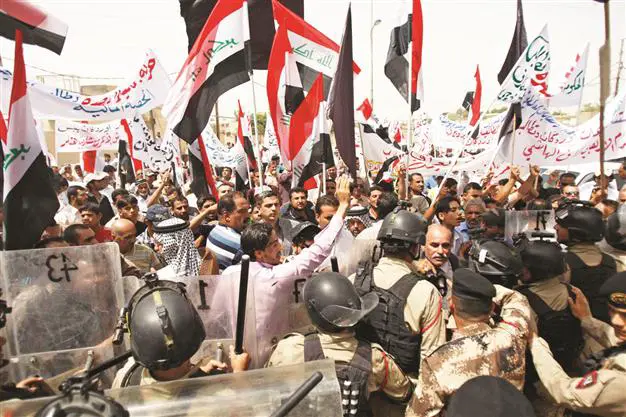The tension between Iraq and Turkey over the recent deployment of Turkish troops near Mosul is seen as a reflection of deep regional and international divisions, with the parties concerned vying for a bigger role in shaping the region's future.
Over the weekend, Ankara angered Baghdad by dispatching reinforcement troops without authorization of the Iraqi government, which condemned the move as a serious breach of Iraqi sovereignty.
Iraq on Saturday summoned the Turkish ambassador in Baghdad and demanded an immediate withdrawal of the Turkish troops.
Analysts here say the latest crisis is a reflection of Turkey's perceived efforts to creat new balances in the region as it seeks to pursue a greater future role in the region after the Islamic State (IS) terrorist group, which currently controls large parts of Syria and Iraq, is defeated.
There are now about 3,000 Turkish soldiers in northern Iraq's semi-autonomous region of Kurdistan, most operating as liaison teams and others work in three training bases, two in Kurdistan and one near IS-held Mosul.
According to Safeen Dizayee, spokesman of Kurdistan Regional Government (KRG), the Turkish forces were deployed within the framework of an international anti-IS coalition.
"Turkey opened two military training bases for Peshmerga forces at the end of 2014 in Soran and Qalacholan districts in the Kurdistan region."
Turkey also operates a third training base for Sunni Arab paramilitary forces in Bashiqa area, near Mosul, and provided military assistance.
On Dec. 4, Turkey sent some 400 commandos and around 100 tank personnel to Bashiqa training camp, to join about 100 advisors already there.
Ankara said the deployment was made against the background of increasing clashes with IS in Mosul, capital of Nineveh province, which has been under IS control since June 2014.
After Baghdad's strong reaction, Turkey said on Tuesday that it has halted the deployment of additional troops to northern Iraq for the time being, but will not withdraw those already there.
Tanju Bilgic, a Turkish Foreign Ministry spokesperson, said the Turkish military has trained 2,441 people in Bashiqa for the battle of Mosul, and that the training mission has been coordinated with the Iraqi Kurdish regional government and Iraqi authorities.
Ibrahim al-Ameri, a political analyst, told Xinhua that "the goal behind Ankara's reinforcement activities is apparently attributed to its desire to lead an anti-IS alliance with Sunni Arabs and KRG in order to provide counterweight to the powerful anti-IS alliance with Iraqi Shiites and Iran under Russia's umbrella.
"Ankara wants to have troops on the ground in Iraq and Syria in one way or another to avoid possible fait accompli that might distance Turkey away from the game in the region in the post-IS future," Ameri said.
Another reason that pushes Turkey to maintain a presence in northern Iraq is to protect the areas of its allied Kurds, Turkmen and some Sunni Arabs in Mosul, who reject the presence of Shiite paramilitary units, known as Hashd Shaabi, if IS was defeated from Mosul in the future, Ameri added.
"So far, Ankara seems to back Iraq's territorial integrity, but it is planning for a worse scenario" if Iraq is split up, Ameri said. "Ankara would undoubtedly be willing to be the key player by empowering its allies and weakening its foes."
As for Iraq, the leading Shiite political parties are putting huge pressures on Prime Minister Haider al-Abadi to take a strong stance against Turkey.
"The Baghdad government, which is dominated by Shiite parties, publicly introduces itself as part of the U.S.-led coalition against the IS, but the hearts and minds of the Shiite parties are with Iran and their brothers of the Alawite Shiite minority led by (Syrian president) Bashar al-Assad," Najib al-Jubouri, another political analyst, told Xinhua.
"They have militias in Syria fighting along with the Assad regime under the Russian umbrella," Jubouri added.
And for the Sunni Kurds, who are struggling to maintain good relations with the Baghdad government and its powerful Shiite parties, their hearts and minds are with the Americans, who give them great hope in realizing their dream of establishing a Kurdish state, Jubouri said.
For now, however, Baghdad's outrage cannot go beyond diplomatic representations, observers say, as Abadi only has very limited alternatives, because the Iraqi army and allied Shiite militias have no direct access to the roads leading to Mosul, which are now all controlled by IS militants.
And Baghdad's furious reaction to the Turkish move looks like part of the struggle between the Russian-led anti-IS alliance and the U.S.-led anti-IS coalition in the region, Jubouri said.
 简体中文
简体中文

